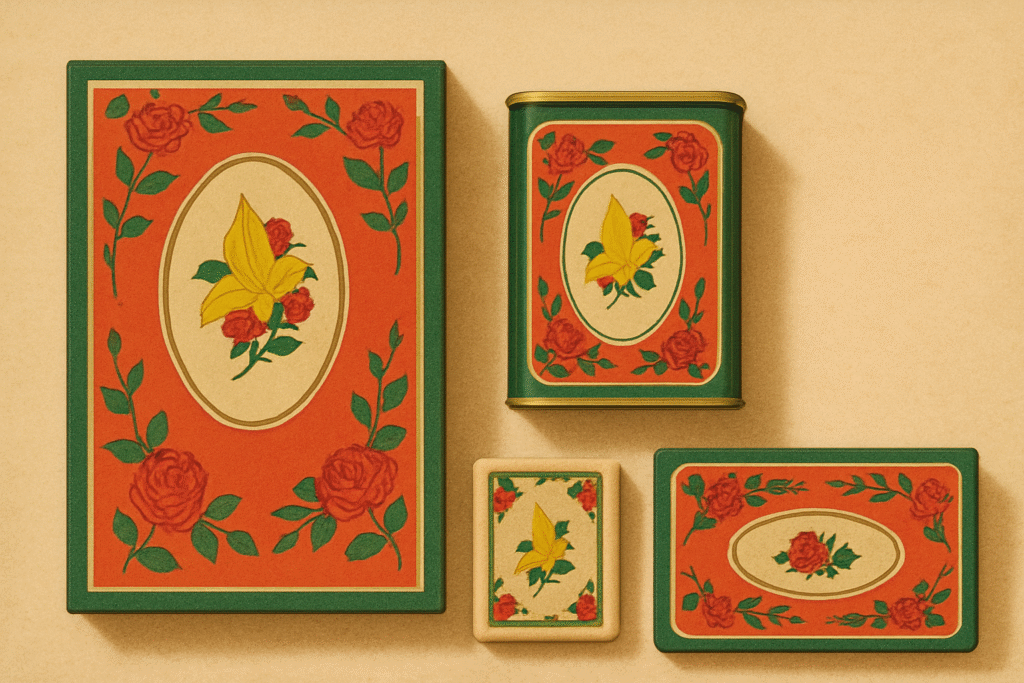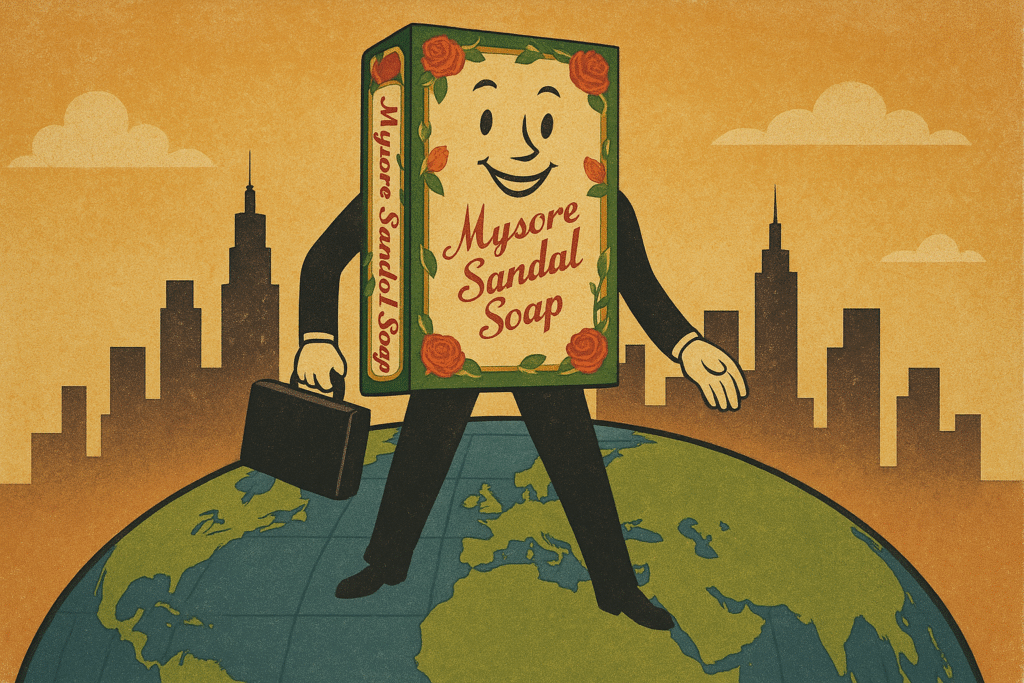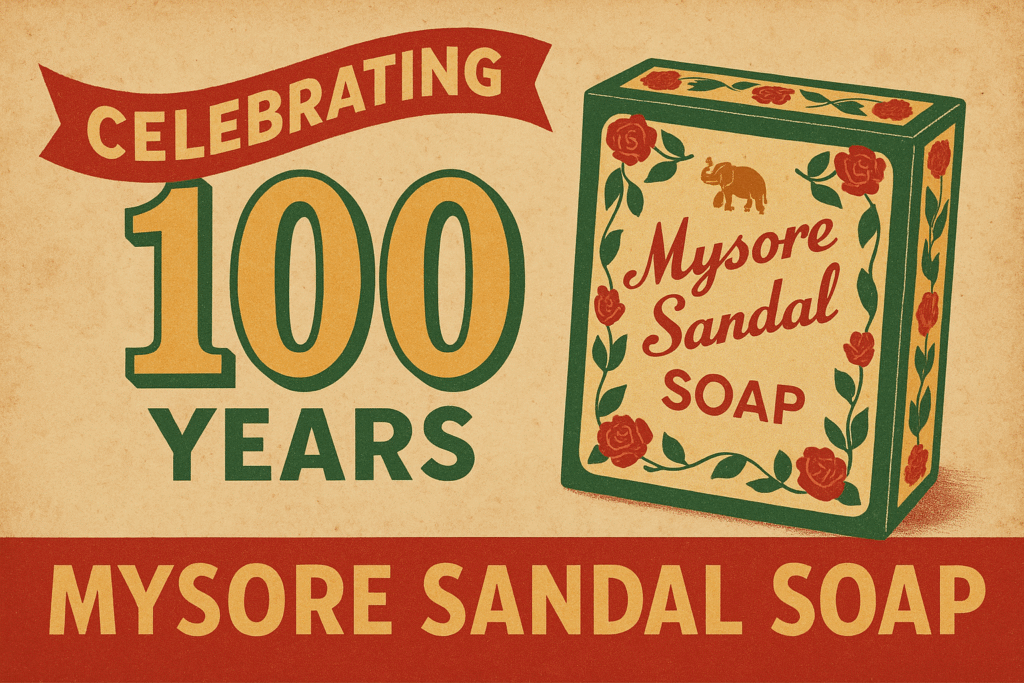On our earth, where international beauty brands are dominating stores’ racks, few indigenous names have stood the test of time with the pride, purity, and history of the native place, Mysore Sandal Soap. With a legacy spanning over ten decades, Mysore Sandal Soap is more than just a beauty essential, but it’s a bar of South Indian tradition, true elegance, and aromatic ‘Guzra Zamana’.
The Royal Beginning
Mysore Sandal Soap roots its back to 1916, when the then King of Mysore, Nalwadi Krishnaraja Wadiyar Fourth, envisioned a way to use the vast reserves of sandalwood forests in the Mysore kingdom and in the whole country.
As Indian history says, with the helping hands of Sir M. V. Diwan of Mysore and a noted engineer, Maharaja N. Krishnaraja established the Government Sandalwood Oil Factory in 1916 in Bengaluru.
Yes! A long time back, the factory was set up primarily to extract pure sandalwood oil (Shudh Chandan Ka Tel), which was a precious commodity exported to the whole world, but… Sadly, World War I disrupted global trade, especially with Germany, which was a major buyer.
The whole ‘Samrajya’ had to find an indigenous use for the surplus oil, and they led to the birth of a 100% Indian-made and 100% pure sandalwood-oil-based soap, named Mysore Sandal Soap in 1918.
The Unique Formula
Do you know what sets Mysore Sandal Soap apart from other soaps?
So, its usage of pure, natural Santalum album (Chandan Ki Lakdi). Top quality sandalwood and sandalwood oil is sourced from native forests of Karnataka, Mysore, India, as an ingredient that not only gives the soap its iconic, soothing fragrance but also imparts numerous healthy skin benefits:
- Acts as a natural antiseptic
- Helps in keeping the skin soft and blemish-free
- Reduces inflammation and has cooling properties
- Enhances complexion over regular use
The soap contains no artificial fragrance — the aroma you get is the result of real, distilled sandalwood oil.
The Iconic Packaging

Dear readers! You know well, nowadays aesthetics matter; therefore, Mysore Sandal Soap proves it. Look at its packaging, which hasn’t changed drastically in decades, and by design, it is still nostalgic.
The golden-yellow box with a red flowery border, interspersed with green vines and pink roses, a royal elephant logo, everything to exude a retro-type world charm.
Let’s talk about the center’s logo of an elephant, holding a sandalwood branch and symbolizing powerful strength and pure nature.
There is a statement on the pack that also proudly says it is “The only soap with 100% pure sandalwood oil,” with no error or question mark. This is not just a tagline; it’s an announcement of authenticity, one that very few soaps in the world can claim.
Mysore Sandal Soap Gift Pack: For Indians, it is not just a soap, it is a symbol of our culture, our motherland, and our roots, therefore, there are some gift pack options too in the market which feature the state government’s seal, especially gift boxes and limited editions. To make your loved ones feel aesthetic and royal, it is also reinforcing the brand’s official and historic legacy.
KSDL – The Brand Behind the Soap
The factory means the company which manufactures Mysore Sandal Soap, is Karnataka Soaps and Detergents Limited (KSDL). It is a government-owned enterprise and was originally the Maharaja’s dream factory, established in 1916. We don’t know why, but in 1980, it was changed into KSDL and became a public-sector undertaking.
Over the years, KSDL has diversified into other personal care products — including talcum powders, Mysore incense sticks (agarbatti), detergents, and other varieties of soaps like:
- Mysore Sandal Talc
- Mysore Sandal Millennium (a premium variant)
- Mysore Sandal Baby Soap
- Herbal and floral variants
However, the classic Mysore Sandal Soap remains its flagship product and a symbol of timeless trust.
Interesting Facts About Mysore Sandal Soap
1) One of the oldest-running soaps in India
Mysore Sandal Soap has been continuously in production since 1918 — over 106 years now.
2) The only soap in the world made from 100% pure sandalwood oil
Others may use synthetic substitutes or low-grade oils, but Mysore Sandal Soap continues to use genuine, distilled oil from Indian sandalwood trees, which are among the most valued in the world.
3) A GI-tagged product
Mysore Sandal Soap holds the Geographical Indication (GI) tag, which certifies that only this soap, made in Karnataka, using local sandalwood, can be labeled under this name.
4) Used by royalty and commoners alike
Historically, this soap was gifted to foreign dignitaries and monarchs. Today, it is accessible to everyone and is often gifted during festivals like Diwali or weddings as a token of purity and prosperity.
5) High export value
Despite being a government-run brand, KSDL exports Mysore Sandal Soap to over 15 countries, including the US, UAE, Australia, and parts of Europe.
6) Millennium Soap – India’s costliest soap
KSDL once launched a limited-edition Mysore Sandal Millennium Soap for ₹720 a bar. It came in a premium gift box and contained higher concentrations of pure sandalwood oil.
7) Still made using the traditional method
The production of the soap still involves traditional soap-making techniques, ensuring the natural oils and therapeutic qualities remain intact.
The Brand Today

Despite the explosion of modern beauty products and international skincare giants in India, Mysore Sandal Soap continues to hold its ground. In fact, KSDL reported profits of ₹33 crore in FY 2023, with Mysore Sandal Soap still contributing the largest share of revenue.
It is widely available in supermarkets, online shopping platforms, Ayurvedic stores, and even boutique gift shops that showcase Indian heritage products.
Sandalwood Oil Shortage and Innovation
One of the major challenges KSDL has faced is the decline in sandalwood tree availability since the tree takes decades to mature and is now a protected species in India. To tackle this, the Karnataka government has allowed private cultivation of sandalwood, and KSDL sources its oil ethically from regulated farms and plantations.
They’ve also innovated by reducing the quantity of sandalwood oil in some variants to make them more affordable for the masses while maintaining the high-end segment with the original formula.
Why It Still Matters Today
In today’s Gen Z world, where we are driven by artificial fragrances, synthetic colors, and fast consumerism, Mysore Sandal Soap drags us to the time when the purity of ingredients, patience of naturality, and heritage of the pillars matter. It is about cleansing the body and experiencing a scent that lingers with memories of baths after school, during summer vacations, and more childhood time. Chandan soap is a piece of India’s cultural history that is wrapped in a floral box.
Conclusion
As you all know now, Mysore Sandal Soap is a symbol of India’s self-reliance, royal craftsmanship, commitment to purity, and entrepreneurship. From royal gift boxes to daily bathroom shelves, it has bridged generations without losing its charm.
So the next time you spot that golden box with rose vines, read the details about Mysore Sandal Soap, holding a legacy that has bathed India in its scent for over 100 years.



